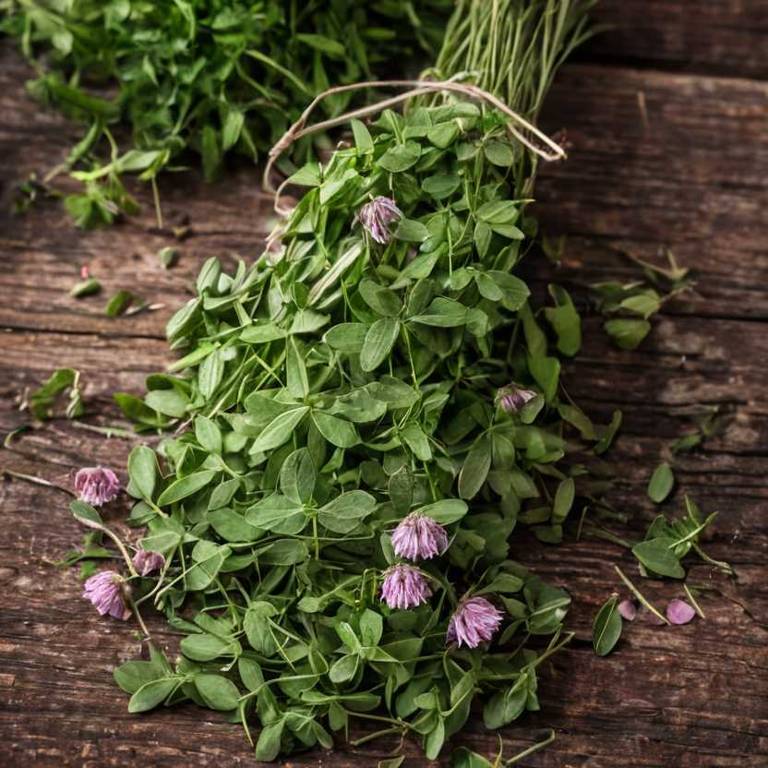Red Clover (Trifolium pratense)
Red Clover (Trifolium pratense) is a member of the Fabaceae family, native to Europe, Asia, and North America. Traditionally, its leaves, flowers, and roots have been used for infusions, decoctions, and poultices.
This herb is particularly valued for its diuretic, anti-inflammatory, and tonic actions, and has a long history of use in european herbal medicine, traditional chinese medicine, and japanese kampo medicine.

Quick Facts / Key Information
| Common Name | Red Clover |
|---|---|
| Scientific Name | Trifolium pratense |
| Plant Family | Fabaceae |
| Genus | Trifolium |
| Species | pratense |
| Native Range | Europe, Asia, North America |
| Plant Parts Used | Leaves, Flowers, Roots |
| Primary Medicinal Actions | Diuretic, Anti-Inflammatory, Tonic |
| Primary Traditional Systems | European Herbal Medicine, Traditional Chinese Medicine, Japanese Kampo Medicine |
| Historical Preparation Methods | Infusion, Decoction, Poultice |
Botanical Identity
- Scientific Name
- Trifolium pratense
- Common Name
- Red Clover
- Synonyms / Alternative Names
- White Clover, Common Clover, Purple Clover
- Plant Family
- Fabaceae
- Genus
- Trifolium
Botanical Description
- Growth Habit
- Perennial herbaceous plant.
- Height
- It typically grows to a height of 20 to 60 centimeters.
- Leaves
- Opposite-pinnate compound leaves with trifoliate arrangement, upper surface glabrous and pale green, lower surface pubescent and darker green, featuring a single stomatal band along the midrib.
- Flowers
- Inflorescence composed of dense spike-like clusters of pink to red bilaterally symmetrical flowers with five petals, two of which are larger and form a keel, and stipitate glands on the keel and standard petals.
- Stems
- Cylindrical, hollow, ascending growth habit with opposite branching, covered in short, glandular hairs, bearing stipitate nodes with foliar scars.
Traditional Uses / Historical Use
Traditional Systems
- European Herbal Medicine
- Traditional Chinese Medicine
- Japanese Kampo Medicine
- Mediterranean Herbal Traditions
Historical Preparation Methods
- Infusion
- Decoction
- Poultice
- Tincture
Medicinal Actions
- Diuretic
- Traditionally described as a calming diuretic, for moisture-related balance.
- Anti-inflammatory
- Commonly referenced as a gentle anti-inflammatory, for irritation-related applications.
- Tonic
- As described in traditional systems, a mild tonic, for broad-use formulations.
- Carminative
- Historically regarded as a soothing carminative, in stomach-related herbal uses.
Active Compounds
- Flavonoid
- A widely occurring class of plant polyphenols found in leaves, flowers, and fruits.
- Phenolic Acid
- A class of aromatic plant compounds commonly found in leaves, seeds, and stems.
- Tannin
- A class of polyphenolic compounds commonly found in bark, leaves, and seeds.
- Coumarin
- Organic compounds biosynthesized as part of plant secondary metabolism.
Modern Research Overview
Modern scientific investigation of this plant has focused on identifying its chemical constituents and examining their properties in controlled research settings. Comprehensive study summaries will be incorporated into this section as additional sources are reviewed.
Safety & Contraindications
- General Precautions
- Caution is advised in certain contexts based on traditional use and available information.
- Contraindications
- Certain contraindications have been reported in relation to the use of this herb.
- Allergies
- Allergic reactions have been reported, particularly in individuals sensitive to related plant families.
- Drug Interactions
- There is insufficient evidence to determine whether this herb interacts with pharmaceutical drugs.
- Toxicity
- There is insufficient evidence to determine the toxic potential of this herb.
- Pregnancy & Breastfeeding
- There is insufficient evidence to determine the safety of this herb during pregnancy or breastfeeding.
Preparation & Usage Methods
- Infusion
- Infusions are commonly prepared using hot water to release aromatic and soluble components.
- Decoction
- A preparation method involving prolonged boiling of roots, bark, or dense plant material.
- Poultice
- A topical preparation made by applying softened plant material externally.
- Powder
- A preparation created by pulverizing dried plant material.
- Tincture
- A preparation involving soaking plant parts in alcohol for extended extraction.
Growing, Harvesting & Storage
Growing / Cultivation
- Soil
- Prefers loamy soil with well-drained conditions. Typically grows best in organically rich soils.
- Sunlight
- Thrives in full sun. Tolerates full sun to partial shade.
- Watering
- Prefers well-balanced moisture levels. Tolerates variable moisture levels.
Medical Disclaimer
The information provided on this page is for educational and informational purposes only. It is not intended to diagnose, treat, cure, or prevent any medical condition. Always consult a qualified healthcare professional before using any herb for medicinal purposes.